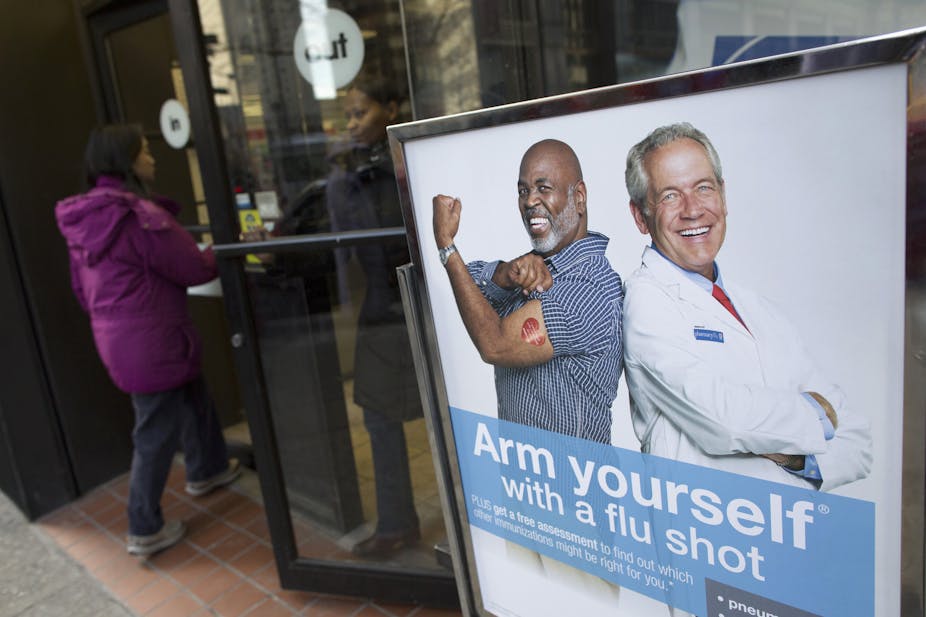Every year in the United States, about 226,000 people are hospitalized because of the flu, and 23,000 die. And about 80-90 percent of flu-related deaths occur in people over 65 years old.
The Centers for Disease Control and Prevention says that the best way to avoid getting the flu is to get vaccinated. We know that in the elderly, compared to younger age groups, flu vaccine does not work as well. This is in part because of age-related decline in immune function and higher prevalence of diseases such as diabetes that diminish immune function.
But older people are also much more likely to take statins. And two new studies, including one from my research group, suggest that people who take these cholesterol-lowering drugs have a lower response to the flu vaccine compared to those who don’t take them.
So should the elderly, particularly those on statins, stop taking flu shots?
Statins might inhibit the flu vaccine
Approximately 25 million, or one in five, Americans over 40 take statins; and rates of statin use are even higher among older individuals. The number of people on statins could increase to 58 million because of expanded eligibility criteria for the drugs.
After a 2012 study suggested that statins may modify response to influenza infection, we decided to explore the effectiveness of flu vaccine in statin users versus nonusers.
My study spanned nine flu seasons, and included 137,488 Georgians, all 45 years or older, most of whom lived in the Atlanta metropolitan area. We compared the effectiveness of flu vaccine for preventing respiratory illness among those on statins versus those not taking these cholesterol-lowering medications.
We found that the vaccine was approximately 35 percent less effective in people taking statins and that the difference between statin users and nonusers increased during the peak of the flu season.
Another group of researchers, from Cincinnati Children’s Hospital and the vaccine company Novartis, looked at the flu vaccine response from a different angle. Unlike our study that counted how many people ended up getting respiratory illness, they evaluated the impact of statins on the antibodies generated by the flu vaccine.
This large, multicountry study found that, compared to nonstatin users, statin users generated 38-67 percent fewer antibodies in response to flu vaccines. Since antibodies are part of the body’s immune response that prevents someone from coming down with influenza, the results from the Cincinnati Children’s Hospital/Novartis study support the findings from our study.
Statins suppress inflammation, which could inhibit immune response
In addition to lowering cholesterol, statins modify our immune system’s response to infection.
There are many possible biological mechanisms that could explain why statins seem to make flu shots less effective.
The most likely mechanism is that statins suppress inflammation. Inflammation is a physiological process responsible for – among other things – recruiting immune cells to the site of infection. It serves as an initial line of defense against viruses and bacteria, and is also helpful in eliciting early immune responses after vaccination.
Another possible mechanism could be the way statins increase the number of regulatory T cells, a type of white blood cell responsible for keeping immune system in check. An increase in regulatory T cells could suppress part of the immune system by “overregulating” it.
That both studies reported similar findings lends credence to their individual conclusions. However, these studies are far from conclusive. For example, neither study directly captured lab-confirmed influenza.
Our study, for instance, looked at respiratory illness but not lab-confirmed flu, and only a proportion of respiratory illness is caused by the flu virus. Similarly, the Cincinnati Children’s Hospital/Novartis study measured antibody levels, which are a useful but imperfect estimate of likely responses against influenza.

This doesn’t mean people on statins should skip the flu shot
Flu vaccine, particularly among the elderly, is far from perfect. However, even with less-than-excellent effectiveness, it is the best tool available for preventing flu. Moreover, flu vaccine is good at preventing flu-related complications in the elderly. For example, the vaccine is 50-60 percent effective for preventing flu-related hospitalizations and 80 percent effective for preventing flu-related deaths. Even if the findings that statins somewhat decrease flu vaccine effectiveness are confirmed by additional studies, the vaccine remains the best available tool for reducing flu-related complications and death.
The research on drugs that affect flu vaccine effectiveness should continue. It is precisely this kind of research that will help in developing better tools, including more effective vaccines, for preventing flu in the elderly. In the meantime, all of us, particularly the elderly, should receive their flu shots – every year.

